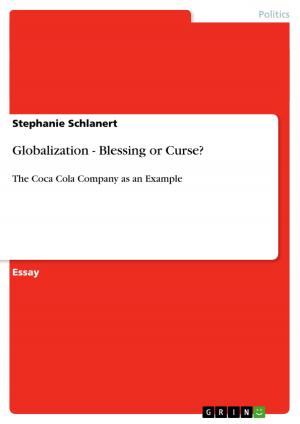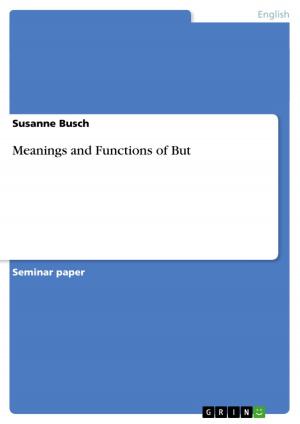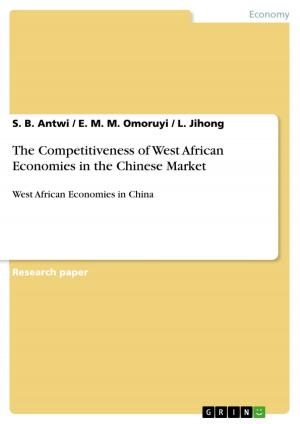Social criticism in Oscar Wilde´s Lady Windermere´s Fan
Fiction & Literature, Literary Theory & Criticism, British| Author: | Simone Conen | ISBN: | 9783638221832 |
| Publisher: | GRIN Publishing | Publication: | October 9, 2003 |
| Imprint: | GRIN Publishing | Language: | English |
| Author: | Simone Conen |
| ISBN: | 9783638221832 |
| Publisher: | GRIN Publishing |
| Publication: | October 9, 2003 |
| Imprint: | GRIN Publishing |
| Language: | English |
Seminar paper from the year 2000 in the subject English Language and Literature Studies - Literature, grade: 1,5 (A), University of Trier (Literature Studies), course: Proseminar Oscar Wilde, 13 entries in the bibliography, language: English, abstract: Victorian England was puritan and it stressed self-discipline, patriotism, family, sexual morality, work and capitalism. There was a predominant inequality in the treatment of the genders; women were discriminated against in many fields of social life. Especially women of the upper and middle classes were not expected to be in employment but to marry and to rear the children. They had an extremely restricted choice of occupation as many professions refused entry to them, for example becoming doctors or bankers represented an impossibility. According to Professor George Peter Landow1, the range of female occupation facilities generally did not go beyond domestic servant, dressmaker and milliner, factory worker, governess or teacher, member of religious order, nurse, writer or prostitute. Usually, female labour consisted only of running the household and offering a pleasant family home to their husbands. Since they did not earn any money with the work as domestic servants who fulfil their duties as housewives and mothers, women were eager to get married and depended on their authoritarian husbands. Girls were brought up to ignore their sexual feelings and to obey their spouse as the head of the family. The whole education of young ladies focused on future marriage and the efforts of the season were to achieve this particular aim. Normally, the parents found the suitable partner for their child and they intervened in case of an undesirable liaison. In other terms, they made the decisions for their daughters. They thought mainly in commercial terms; the social status or the institution ´marriage´ itself seemed far more important than the husband-to-be as a person. Society marriage could be seen as a mere mercenary affair: 'People did not marry for love so much as for the conveniences of the families concerned; all marriages were in this sense 'arranged'.' 2 [...] 1 George Peter Landow, Occupation and employment, Brown University, online, available:http://Landow.stg.brown.edu/Victorian/gender/political.html, 20 August 2000. 2 Christopher Lasch, Divorce and the Family in America, November 1966, online, available:http://www.theatlantic.com/politics/family/divorce.htm, 15 August 2000.
Seminar paper from the year 2000 in the subject English Language and Literature Studies - Literature, grade: 1,5 (A), University of Trier (Literature Studies), course: Proseminar Oscar Wilde, 13 entries in the bibliography, language: English, abstract: Victorian England was puritan and it stressed self-discipline, patriotism, family, sexual morality, work and capitalism. There was a predominant inequality in the treatment of the genders; women were discriminated against in many fields of social life. Especially women of the upper and middle classes were not expected to be in employment but to marry and to rear the children. They had an extremely restricted choice of occupation as many professions refused entry to them, for example becoming doctors or bankers represented an impossibility. According to Professor George Peter Landow1, the range of female occupation facilities generally did not go beyond domestic servant, dressmaker and milliner, factory worker, governess or teacher, member of religious order, nurse, writer or prostitute. Usually, female labour consisted only of running the household and offering a pleasant family home to their husbands. Since they did not earn any money with the work as domestic servants who fulfil their duties as housewives and mothers, women were eager to get married and depended on their authoritarian husbands. Girls were brought up to ignore their sexual feelings and to obey their spouse as the head of the family. The whole education of young ladies focused on future marriage and the efforts of the season were to achieve this particular aim. Normally, the parents found the suitable partner for their child and they intervened in case of an undesirable liaison. In other terms, they made the decisions for their daughters. They thought mainly in commercial terms; the social status or the institution ´marriage´ itself seemed far more important than the husband-to-be as a person. Society marriage could be seen as a mere mercenary affair: 'People did not marry for love so much as for the conveniences of the families concerned; all marriages were in this sense 'arranged'.' 2 [...] 1 George Peter Landow, Occupation and employment, Brown University, online, available:http://Landow.stg.brown.edu/Victorian/gender/political.html, 20 August 2000. 2 Christopher Lasch, Divorce and the Family in America, November 1966, online, available:http://www.theatlantic.com/politics/family/divorce.htm, 15 August 2000.















